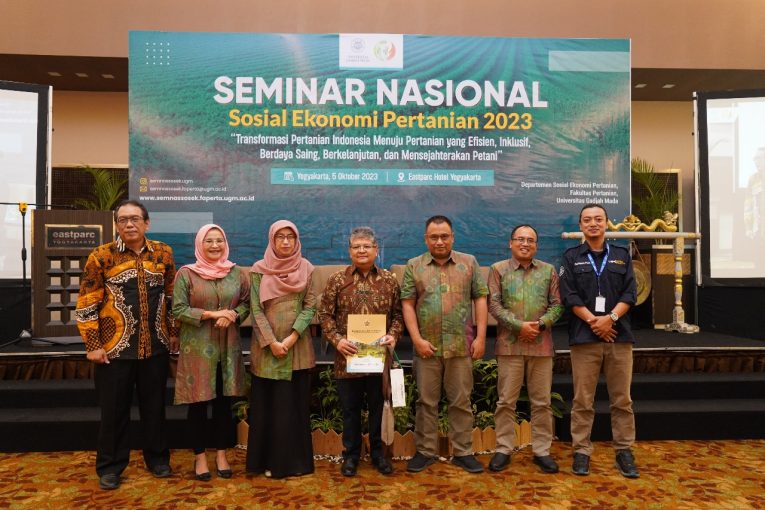
Food security is a common focus that needs to be improved by realizing food sovereignty and food independence. To date, Indonesia has a fairly good score for food affordability, but needs to improve aspects of availability, food quality, and resilience and sustainability of natural resources. For this reason, the government encourages agricultural transformation efforts with inclusive and efficient agricultural development by implementing various policies, such as the development of Closed Loop Horticulture, the development of export-oriented horticultural areas with the CSV (Creating Shared Value) partnership model, control of rice field land conversion, and People’s Business Credit (Kredit Usaha Rakyat/KUR) as a facility for access to financing.
This was conveyed by Dida Gardera, S.T., M.Sc., acting Deputy for Food and Agribusiness Coordination, Coordinating Ministry for Economic Affairs, who was present as a keynote speaker at the National Seminar on Agricultural Socioeconomic Research on Thursday, 6 October 2023 at Eastparc Hotel Yogyakarta. In line with the theme, namely “Transformation of Indonesian Agriculture Towards Efficient, Inclusive, Competitive, Sustainable and Prosperous Agriculture”, three other speakers also delivered material on agricultural transformation from all sides.
Prof. Dr. Jamhari, S.P., M.P., one of the Professors at Department of Agricultural Socioeconomics, Faculty of Agriculture UGM, said that agricultural transformation might be realized with a strong institutional role.
“The agricultural sector in Indonesia cannot be separated from the institutional role with transformation through several ways, such as holding, consolidating, and modernizing agriculture, growing young professional local agricultural entrepreneurs, as well as cooperation between farmer groups, farmer group associations (gapoktan), agricultural cooperatives, and partner companies in the form of BUMNs, BUMDs, BUMDes, and the private sector,” said Prof. Jamhari.
On the other hand, R.R. Yuli Sri Wilanti, S.Pi., M.P. as Assistant Deputy for Horticultural Agribusiness Development, Coordinating Ministry for Economic Affairs added, closed loop horticultural agribusiness is one solution to overcome the problem of mismatch between supply and demand in the horticulture subsector.
“Basically, the problems of the horticulture subsector are related to limitations, as well as mismatches between supply and demand, institutions, assistance, and supply chains, so Indonesia needs to take advantage of the partnership model of closed loop horticultural agribusiness,” she added. Based on her explanation, closed loop is an agribusiness partnership model from upstream to downstream involving multi-stakeholders and developed in a digital-based ecosystem, GAP cultivation techniques, a good distribution system, and guaranteed competitive price markets by off-takers.
Dr. Dwi Indra Purnomo, one of Padjadjaran University lecturers who is also the founder of “The Local Enabler”, emphasized that agricultural transformation needs to realize inclusive agriculture to achieve Golden Indonesia 2045. He explained that the inclusive strategy is designed to combine roles from various sectors, ranging from the government, private sector, farming communities, NGOs, and non-governmental organizations.
“This collaboration ensures that innovation and technology can be accessed and utilized by all levels of agricultural society, thus making them agents of change towards a more just, prosperous, and sustainable Indonesia in 2045,” explained Dr. Dwi.
The National Seminar on Agricultural Socioeconomic Research is expected to be a medium for academics, researchers, observers, government, community, and other stakeholders to make a real contribution through sharing information, conveying ideas, and research findings in strengthening human and socio-economic resources towards efficient, inclusive, competitive, and sustainable agriculture.
Author: Hanita Athasari Zain and Sanditha Setya Wisaksanti
Translator: Shafa Artiannas
